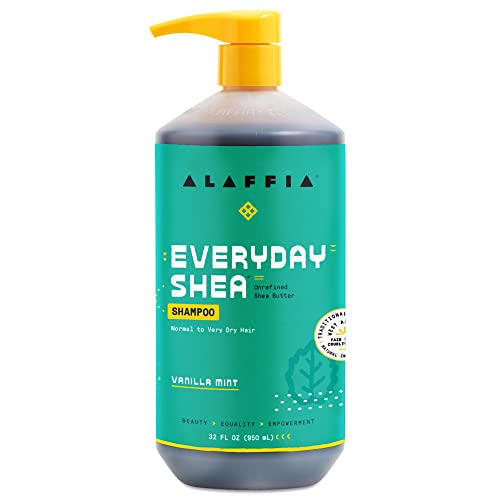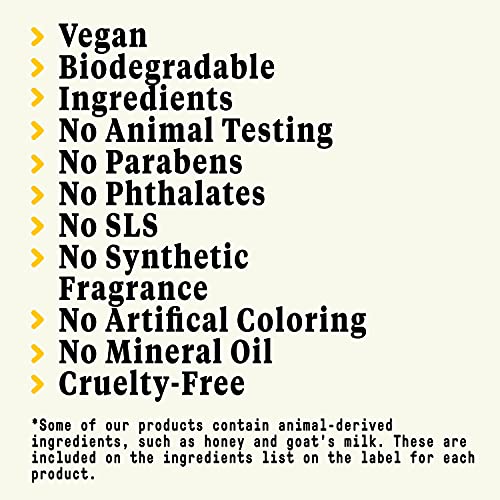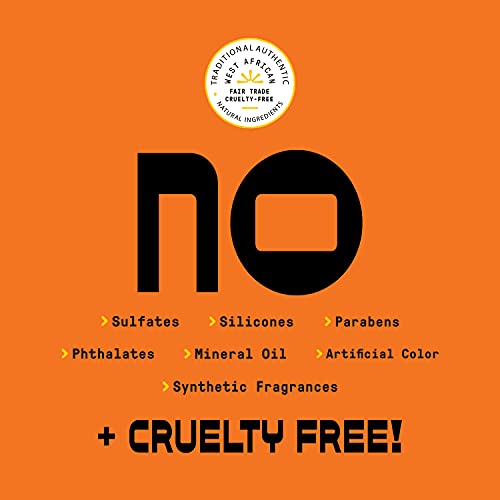




Alaffia EveryDay Shea Shampoo - Nourishing, Fair Trade Ingredients, Vanilla Mint - 32 Fl Oz


Mentha Spicata (Spearmint) Oil
High RiskMentha spicata, commonly known as spearmint oil, is an essential oil derived from the leaves of the spearmint plant. It is often used in various products for its aromatic properties, flavoring, and potential therapeutic benefits.
Sustai Insights
Spearmint oil offers functional benefits, including flavor enhancement and potential antimicrobial properties. However, it is associated with a high risk of allergic reactions, and its use can lead to skin and respiratory irritation. Environmental concerns include potential pollutant effects, although it is not considered bioaccumulative. Regulatory advisories highlight its restricted use in verified products. Overall, the risk level is assessed as high, suggesting cautious use and consideration of safer alternatives.
Cocamidopropyl Betaine
High RiskCocamidopropyl betaine is a synthetic surfactant derived from coconut oil, commonly used in personal care products for its mild cleansing and foaming properties. It functions as a surfactant, emulsifier, and thickening agent, contributing to the texture and performance of formulations.
Sustai Insights
Cocamidopropyl betaine offers functional benefits as a gentle surfactant, enhancing product foaming and texture. However, it may pose low to moderate allergenic risks and is subject to high use restrictions due to contamination concerns. Regulatory bodies have advised on its safe levels of usage, categorizing its risk level as high overall. Users should practice caution, particularly with sensitive populations, and consider alternatives like naturally derived surfactants for safer formulations.
Decyl Glucoside
Low RiskDecyl glucoside is a glucose-based surfactant derived from natural sources, primarily used as a mild cleansing agent in personal care products. It effectively reduces surface tension, allowing for improved mixing of ingredients and enhanced cleansing properties without stripping natural oils from the skin.
Sustai Insights
Decyl glucoside offers functional benefits as a non-ionic surfactant, making it suitable for sensitive skin formulations. It is biodegradable and derived from renewable resources, supporting sustainability. Health risks are primarily low, with minimal concerns regarding irritation and allergies. Environmental risks are low, as it does not significantly contribute to pollution or bioaccumulation. Regulatory status is generally favorable, with low restrictions noted. Overall, decyl glucoside presents a low risk for use in consumer products, making it a suitable choice for gentle formulations.
Vanilla Planifolia (Vanilla) Fruit Extract
Low RiskVanilla planifolia (vanilla) fruit extract is derived from the fruit of the vanilla plant. It is commonly used for its aromatic properties and as a flavoring agent in various products, including food, cosmetics, and personal care items.
Sustai Insights
Vanilla fruit extract offers functional benefits such as flavor enhancement and fragrance. It is sustainably sourced with low environmental impact and exhibits low risk for carcinogenicity and developmental toxicity. However, it may cause skin irritation in some individuals and has low to moderate allergenic potential. Regulatory bodies have not imposed significant restrictions, leading to an overall low risk assessment. Safe usage practices should be observed, and alternatives include synthetic vanillin for those seeking more stable options.
Saponified Butyrospermum Parkii (Shea Butter)
Low RiskSaponified Butyrospermum Parkii (Shea Butter) is derived from the nuts of the shea tree. It functions primarily as a moisturizer in cosmetic formulations, providing emollient properties that help to soften and hydrate the skin.
Sustai Insights
Saponified Butyrospermum Parkii offers effective moisturizing benefits and is typically sustainably sourced, contributing to its positive sustainability profile. Health impacts are minimal, with low concerns regarding carcinogenicity, allergies, and reproductive toxicity. Environmental risks are also low, with no significant pollutant or bioaccumulation concerns. Regulatory status is favorable, with no current restrictions. Overall, the ingredient is assessed as low risk, making it a suitable choice for various applications.
Hydrogenated Coconut Oil
Low RiskHydrogenated coconut oil is an end product of the hydrogenation process, where coconut oil is chemically altered to enhance its stability and shelf-life. It serves primarily as an emollient and thickening agent in cosmetic formulations, providing a smooth texture and moisturizing properties.
Sustai Insights
Hydrogenated coconut oil offers functional benefits as a moisturizing agent and stabilizer in formulations. It is generally recognized as safe with low risks for cancer, allergies, and reproductive toxicity, according to the Cosmetic Ingredient Review (CIR). Environmental impacts are minimal, with no significant pollutant potential. Regulatory bodies have not issued advisories against its use. Overall, the ingredient presents a low risk profile, making it a suitable choice in cosmetic products. For those seeking alternatives, natural oils or non-hydrogenated variants may be considered.
Hydrogenated Coconut Oil
Low RiskHydrogenated coconut oil is an end product of the hydrogenation process, where coconut oil is chemically altered to enhance its stability and shelf-life. It serves primarily as an emollient and thickening agent in cosmetic formulations, providing a smooth texture and moisturizing properties.
Sustai Insights
Hydrogenated coconut oil offers functional benefits as a moisturizing agent and stabilizer in formulations. It is generally recognized as safe with low risks for cancer, allergies, and reproductive toxicity, according to the Cosmetic Ingredient Review (CIR). Environmental impacts are minimal, with no significant pollutant potential. Regulatory bodies have not issued advisories against its use. Overall, the ingredient presents a low risk profile, making it a suitable choice in cosmetic products. For those seeking alternatives, natural oils or non-hydrogenated variants may be considered.
Hydrogenated Coconut Oil
Low RiskHydrogenated coconut oil is an end product of the hydrogenation process, where coconut oil is chemically altered to enhance its stability and shelf-life. It serves primarily as an emollient and thickening agent in cosmetic formulations, providing a smooth texture and moisturizing properties.
Sustai Insights
Hydrogenated coconut oil offers functional benefits as a moisturizing agent and stabilizer in formulations. It is generally recognized as safe with low risks for cancer, allergies, and reproductive toxicity, according to the Cosmetic Ingredient Review (CIR). Environmental impacts are minimal, with no significant pollutant potential. Regulatory bodies have not issued advisories against its use. Overall, the ingredient presents a low risk profile, making it a suitable choice in cosmetic products. For those seeking alternatives, natural oils or non-hydrogenated variants may be considered.
Butyrospermum Parkii (Shea Butter) Extract
Low RiskButyrospermum parkii (shea butter) extract is a natural fat obtained from the nuts of the shea tree, primarily used in cosmetics for its emollient properties, providing moisture and improving skin texture. It is often included in formulations for creams, lotions, and balms.
Sustai Insights
Butyrospermum parkii extract offers functional benefits such as moisturizing and skin conditioning, while being biodegradable and sustainably sourced. Health risks are low, with minimal concerns regarding carcinogenicity, allergies, or reproductive toxicity. Environmental impacts are also low, and it has no significant regulatory warnings. Given the overall favorable profile, the risk level is assessed as low, making it a suitable choice in cosmetic formulations.
Water
Low RiskWater is a clear, colorless liquid essential for various biological processes. It serves as a solvent in formulations, facilitating the dissolution of other ingredients and enhancing product texture and application. Additionally, water plays a crucial role in hydration and is a key component in many cosmetic and personal care products.
Sustai Insights
Water is an effective solvent and hydrator, contributing to the texture and efficacy of formulations. It is biodegradable and generally regarded as safe, with low concerns regarding carcinogenicity, allergies, and reproductive toxicity. However, excessive water usage can lead to environmental concerns, particularly regarding resource depletion. Regulatory bodies do not impose restrictions on water use in cosmetics. Overall, the risks associated with water are low, making it a safe and essential ingredient.
Sodium Chloride
Low RiskSodium chloride is an inorganic salt commonly known as table salt. It is primarily used in food preservation and flavor enhancement, as well as in various industrial applications. It exists as a crystalline solid and dissolves easily in water, making it effective for diverse uses in food products and other formulations.
Sustai Insights
Sodium chloride serves essential functions in food preservation and flavor enhancement. It is considered safe with low health risks related to cancer, allergies, and reproductive toxicity. Environmental concerns are minimal, as it does not bioaccumulate and poses low pollutant potential. Regulatory bodies, including the FDA, recognize its safety for consumption. Overall, sodium chloride carries a low risk profile, making it a widely accepted ingredient in food and cosmetic products.
Decyl Glucoside
Low RiskDecyl glucoside is a glucose-based surfactant derived from natural sources, primarily used as a mild cleansing agent in personal care products. It effectively reduces surface tension, allowing for improved mixing of ingredients and enhanced cleansing properties without stripping natural oils from the skin.
Sustai Insights
Decyl glucoside offers functional benefits as a non-ionic surfactant, making it suitable for sensitive skin formulations. It is biodegradable and derived from renewable resources, supporting sustainability. Health risks are primarily low, with minimal concerns regarding irritation and allergies. Environmental risks are low, as it does not significantly contribute to pollution or bioaccumulation. Regulatory status is generally favorable, with low restrictions noted. Overall, decyl glucoside presents a low risk for use in consumer products, making it a suitable choice for gentle formulations.
Mentha Spicata (Spearmint) Oil
High RiskMentha spicata, commonly known as spearmint oil, is an essential oil derived from the leaves of the spearmint plant. It is often used in various products for its aromatic properties, flavoring, and potential therapeutic benefits.
Sustai Insights
Spearmint oil offers functional benefits, including flavor enhancement and potential antimicrobial properties. However, it is associated with a high risk of allergic reactions, and its use can lead to skin and respiratory irritation. Environmental concerns include potential pollutant effects, although it is not considered bioaccumulative. Regulatory advisories highlight its restricted use in verified products. Overall, the risk level is assessed as high, suggesting cautious use and consideration of safer alternatives.
Vanilla Planifolia (Vanilla) Fruit Extract
Low RiskVanilla planifolia (vanilla) fruit extract is derived from the fruit of the vanilla plant. It is commonly used for its aromatic properties and as a flavoring agent in various products, including food, cosmetics, and personal care items.
Sustai Insights
Vanilla fruit extract offers functional benefits such as flavor enhancement and fragrance. It is sustainably sourced with low environmental impact and exhibits low risk for carcinogenicity and developmental toxicity. However, it may cause skin irritation in some individuals and has low to moderate allergenic potential. Regulatory bodies have not imposed significant restrictions, leading to an overall low risk assessment. Safe usage practices should be observed, and alternatives include synthetic vanillin for those seeking more stable options.
Saponified Butyrospermum Parkii (Shea Butter)
Low RiskSaponified Butyrospermum Parkii (Shea Butter) is derived from the nuts of the shea tree. It functions primarily as a moisturizer in cosmetic formulations, providing emollient properties that help to soften and hydrate the skin.
Sustai Insights
Saponified Butyrospermum Parkii offers effective moisturizing benefits and is typically sustainably sourced, contributing to its positive sustainability profile. Health impacts are minimal, with low concerns regarding carcinogenicity, allergies, and reproductive toxicity. Environmental risks are also low, with no significant pollutant or bioaccumulation concerns. Regulatory status is favorable, with no current restrictions. Overall, the ingredient is assessed as low risk, making it a suitable choice for various applications.
Hydrogenated Coconut Oil
Low RiskHydrogenated coconut oil is an end product of the hydrogenation process, where coconut oil is chemically altered to enhance its stability and shelf-life. It serves primarily as an emollient and thickening agent in cosmetic formulations, providing a smooth texture and moisturizing properties.
Sustai Insights
Hydrogenated coconut oil offers functional benefits as a moisturizing agent and stabilizer in formulations. It is generally recognized as safe with low risks for cancer, allergies, and reproductive toxicity, according to the Cosmetic Ingredient Review (CIR). Environmental impacts are minimal, with no significant pollutant potential. Regulatory bodies have not issued advisories against its use. Overall, the ingredient presents a low risk profile, making it a suitable choice in cosmetic products. For those seeking alternatives, natural oils or non-hydrogenated variants may be considered.
Hydrogenated Coconut Oil
Low RiskHydrogenated coconut oil is an end product of the hydrogenation process, where coconut oil is chemically altered to enhance its stability and shelf-life. It serves primarily as an emollient and thickening agent in cosmetic formulations, providing a smooth texture and moisturizing properties.
Sustai Insights
Hydrogenated coconut oil offers functional benefits as a moisturizing agent and stabilizer in formulations. It is generally recognized as safe with low risks for cancer, allergies, and reproductive toxicity, according to the Cosmetic Ingredient Review (CIR). Environmental impacts are minimal, with no significant pollutant potential. Regulatory bodies have not issued advisories against its use. Overall, the ingredient presents a low risk profile, making it a suitable choice in cosmetic products. For those seeking alternatives, natural oils or non-hydrogenated variants may be considered.
Hydrogenated Coconut Oil
Low RiskHydrogenated coconut oil is an end product of the hydrogenation process, where coconut oil is chemically altered to enhance its stability and shelf-life. It serves primarily as an emollient and thickening agent in cosmetic formulations, providing a smooth texture and moisturizing properties.
Sustai Insights
Hydrogenated coconut oil offers functional benefits as a moisturizing agent and stabilizer in formulations. It is generally recognized as safe with low risks for cancer, allergies, and reproductive toxicity, according to the Cosmetic Ingredient Review (CIR). Environmental impacts are minimal, with no significant pollutant potential. Regulatory bodies have not issued advisories against its use. Overall, the ingredient presents a low risk profile, making it a suitable choice in cosmetic products. For those seeking alternatives, natural oils or non-hydrogenated variants may be considered.
Butyrospermum Parkii (Shea Butter) Extract
Low RiskButyrospermum parkii (shea butter) extract is a natural fat obtained from the nuts of the shea tree, primarily used in cosmetics for its emollient properties, providing moisture and improving skin texture. It is often included in formulations for creams, lotions, and balms.
Sustai Insights
Butyrospermum parkii extract offers functional benefits such as moisturizing and skin conditioning, while being biodegradable and sustainably sourced. Health risks are low, with minimal concerns regarding carcinogenicity, allergies, or reproductive toxicity. Environmental impacts are also low, and it has no significant regulatory warnings. Given the overall favorable profile, the risk level is assessed as low, making it a suitable choice in cosmetic formulations.
Water
Low RiskWater is a clear, colorless liquid essential for various biological processes. It serves as a solvent in formulations, facilitating the dissolution of other ingredients and enhancing product texture and application. Additionally, water plays a crucial role in hydration and is a key component in many cosmetic and personal care products.
Sustai Insights
Water is an effective solvent and hydrator, contributing to the texture and efficacy of formulations. It is biodegradable and generally regarded as safe, with low concerns regarding carcinogenicity, allergies, and reproductive toxicity. However, excessive water usage can lead to environmental concerns, particularly regarding resource depletion. Regulatory bodies do not impose restrictions on water use in cosmetics. Overall, the risks associated with water are low, making it a safe and essential ingredient.
Sodium Chloride
Low RiskSodium chloride is an inorganic salt commonly known as table salt. It is primarily used in food preservation and flavor enhancement, as well as in various industrial applications. It exists as a crystalline solid and dissolves easily in water, making it effective for diverse uses in food products and other formulations.
Sustai Insights
Sodium chloride serves essential functions in food preservation and flavor enhancement. It is considered safe with low health risks related to cancer, allergies, and reproductive toxicity. Environmental concerns are minimal, as it does not bioaccumulate and poses low pollutant potential. Regulatory bodies, including the FDA, recognize its safety for consumption. Overall, sodium chloride carries a low risk profile, making it a widely accepted ingredient in food and cosmetic products.
Cocamidopropyl Betaine
High RiskCocamidopropyl betaine is a synthetic surfactant derived from coconut oil, commonly used in personal care products for its mild cleansing and foaming properties. It functions as a surfactant, emulsifier, and thickening agent, contributing to the texture and performance of formulations.
Sustai Insights
Cocamidopropyl betaine offers functional benefits as a gentle surfactant, enhancing product foaming and texture. However, it may pose low to moderate allergenic risks and is subject to high use restrictions due to contamination concerns. Regulatory bodies have advised on its safe levels of usage, categorizing its risk level as high overall. Users should practice caution, particularly with sensitive populations, and consider alternatives like naturally derived surfactants for safer formulations.
Experience the nourishing power of Alaffia EveryDay Shea Shampoo, a sulfate-free formula designed for normal to dry hair. Infused with fair-trade shea butter and virgin coconut oil, this gentle shampoo cleanses without stripping natural oils, leaving hair soft and revitalized. Enjoy the refreshing vanilla mint scent while supporting a mission of sustainability and community empowerment.
- Gentle Cleansing: Effectively cleanses hair and scalp without harsh sulfates, preserving natural moisture balance.
- Nourishing Ingredients: Enriched with raw shea butter and coconut oil, this shampoo deeply hydrates and protects hair from root to tip.
- Refreshingly Scented: The delightful vanilla mint fragrance invigorates the senses while promoting a clean and healthy scalp.
- Ethically Made: Crafted with fair-trade ingredients, supporting women-led cooperatives in West Africa and their commitment to education and sustainability.
- Cruelty-Free and Clean: Formulated without parabens, phthalates, or artificial fragrances, ensuring a safe choice for both you and the environment.
Subscribe & Save with Sustai
- Best Price Guarantee: Always enjoy the lowest prices on sustainable home essentials.
- No Surprises: We’ll notify you before shipping. No hidden fees, ever.
- You’re in Charge: Change, pause, or cancel your subscription anytime with ease.
- Eco-Friendly Deliveries: Our grouped shipments mean less packaging and lower emissions.
Join us on a sustainable journey. Special offers for a limited time! Prices and promotions may change.
Recommended Products
Experience the nourishing power of Alaffia EveryDay Shea Shampoo, a sulfate-free formula designed for normal to dry hair. Infused with fair-trade shea butter and virgin coconut oil, this gentle shampoo cleanses without stripping natural oils, leaving hair soft and revitalized. Enjoy the refreshing vanilla mint scent while supporting a mission of sustainability and community empowerment.
- Gentle Cleansing: Effectively cleanses hair and scalp without harsh sulfates, preserving natural moisture balance.
- Nourishing Ingredients: Enriched with raw shea butter and coconut oil, this shampoo deeply hydrates and protects hair from root to tip.
- Refreshingly Scented: The delightful vanilla mint fragrance invigorates the senses while promoting a clean and healthy scalp.
- Ethically Made: Crafted with fair-trade ingredients, supporting women-led cooperatives in West Africa and their commitment to education and sustainability.
- Cruelty-Free and Clean: Formulated without parabens, phthalates, or artificial fragrances, ensuring a safe choice for both you and the environment.

You can have at most 2 Sustainable Steals products in your cart
Customer Reviews
Customers’ View
Customers generally appreciate the gentle cleansing properties and nourishing ingredients of this shampoo, especially those with fragrance sensitivities. Many find the vanilla mint scent pleasant and enjoy how it leaves their hair feeling soft. However, there are mixed opinions on the moisture level; while some report their hair feels well-moisturized, others experience dryness or greasiness. The quality of the shampoo is praised by many, particularly for its natural formulation, but there are also concerns about its effectiveness in cleaning. Overall, consumers value the product's commitment to fair trade and cruelty-free practices, aligning well with their eco-friendly and health-conscious values.
AI-generated from the text of customer reviewsThis product is rated 4.7 of 5.0 stars.
It has received 3 reviews.





